Lee Kuan Yew’s Legacy
Modern Singapore's founder passed away at age 91 earlier this week.
Modern Singapore’s founder and first prime minister (serving from 1959 to 1990) passed away at age 91 earlier this week.
Reuters (“Lee Kuan Yew, founding father of modern Singapore, dies at 91“):
Lee Kuan Yew, Singapore’s first prime minister, died on Monday aged 91, triggering a flood of tributes to the man who oversaw the tiny city-state’s rapid rise from a British colonial backwater to a global trade and financial center.
U.S. President Barack Obama described Lee, who ruled Singapore for three decades, as “a true giant of history” whose advice on governance and economic development had been sought by other world leaders down the years.
In his lifetime, Lee drew praise for his market-friendly policies, but also criticism at home and abroad for his strict controls over the press, public protest and political opponents.
Lee had receded from public and political life over the past few years, but was still seen as an influential figure in the government of Prime Minister Lee Hsien Loong, his eldest son.
[…]
Lee, a British-educated lawyer, is credited with building Singapore into one of the world’s wealthiest nations on a per capita basis with a strong, pervasive role for the state and little patience for dissent.
He was unapologetic for clamping down fiercely on his opponents, saying it was essential for the country’s security.
“We have to lock up people, without trial, whether they are communists, whether they are language chauvinists, whether they are religious extremists. If you don’t do that, the country would be in ruins,” he said in 1986.
New York Times (“Lee Kuan Yew, Founding Father and First Premier of Singapore, Dies at 91“) has an in-depth portrait of the key moments of his premiership, including the separation from Malaysia and creation of a separate model of development:
Since Singapore separated from Malaysia in 1965 — an event Mr. Lee called his “moment of anguish” — he had seen himself in a never-ending struggle to overcome the nation’s lack of natural resources, a potentially hostile international environment and a volatile ethnic mix of Chinese, Malays and Indians.
“To understand Singapore and why it is what it is, you’ve got to start off with the fact that it’s not supposed to exist and cannot exist,” he said in the 2007 interview. “To begin with, we don’t have the ingredients of a nation, the elementary factors: a homogeneous population, common language, common culture and common destiny. So, history is a long time. I’ve done my bit.”
His “Singapore model” included centralized power, clean government and economic liberalism. But it was also criticized as a soft form of authoritarianism, suppressing political opposition, imposing strict limits on free speech and public assembly, and creating a climate of caution and self-censorship. The model has been studied by leaders elsewhere in Asia, including China, and the subject of many academic case studies.
[…]
Mr. Lee was a master of so-called “Asian values,” in which the good of society takes precedence over the rights of the individual and citizens cede some autonomy in return for paternalistic rule.
Generally passive in political affairs, Singaporeans sometimes chide themselves as being overly preoccupied with a comfortable lifestyle, which they sum up as the “Five C’s” — cash, condo, car, credit card, country club.
At the time of independence, Singapore was a poor, backward place without significant natural resources. Lee’s government at the time saw union with Malaysia as the only way forward. However, due to ethnic tensions (the addition of Singapore tipped the delicate racial balance in the new country towards the Chinese) and political disagreements, Singapore was expelled in 1965. By all accounts, Lee took it hard, even fighting back tears when he announced the event to the press and having trouble sleeping for days afterwards. Some may say that moment of adversity created the opportunity to develop Singapore along the lines of a radical idea – a multiethnic pluralistic society guided by a single party dictatorship of technocrats.
Lee’s Singapore is often held as the model of development for most of East Asia, especially in the Mandarin-speaking world, in a way that may seem strange to an outside western observer. The almost obsessive focus on economic development over political and personal freedom is accepted and tolerated by many East Asians as the price for prosperity. Understanding this is the key to understanding the future of China. Ever since Mao’s leadership was discredited and Deng steered the country towards market capitalism while still retaining tight state controls over other aspects of society, Singapore has been held as the aspiration for China’s evolution. In a way, it reflects a profound sense of regret and yearning. While both Mao and Lee inherited a country wracked by chaos, Lee achieved a far more impressive end product with his leadership.
The Wall Street Journal (“How ‘Old Friend’ Lee Kuan Yew Influenced China“) reports:
The depth of coverage mirrored the warmth of bilateral ties between top leaders from China and Singapore — a close relationship for which the seeds were sown nearly four decades earlier, when Mr. Lee—as prime minister—made his first official trip to China and met briefly with an ailing Mao Zedong.
Mr. Lee subsequently visited the mainland more than 30 times. In his meetings with high-level Communist leaders, he formed a particular bond with Deng Xiaoping, the Chinese leader credited for launching vital pro-market reforms and kickstarting China’s meteoric rise as an economic power, who reciprocated Mr. Lee’s visit with a trip to Singapore in 1978.
“Starting with Deng Xiaoping, Chinese leaders [were] quite frank about the fact that there are many things they can learn from Singapore,” said Willy Lam, an expert in Chinese elite politics and senior fellow at the Jamestown Foundation, a Washington-based think tank.
Such lessons include Singapore’s model of rapid economic development paired with tight political controls, along with Mr. Lee’s appeal to Confucianism and so-called “Asian values,” which he used to justify curbs on civil liberties and his rejection of Western-style liberal democracy.
“China is not going to become a liberal democracy; if it did, it would collapse,” Mr. Lee said in an interview published in a 2013 book, titled “Lee Kuan Yew: The Grandmaster’s Insights on China, the United States and the World.” “I do not believe you can impose on other countries standards which are alien and totally disconnected with their past.”
“If they change in a pragmatic way, as they have been doing, keeping tight security control and not allowing riots and not allowing rebellions and, at the same time, easing up… it is holdable,” Mr. Lee said, referring to the Communist Party’s ability to keep its grip on political power. “One thing is for sure: the present system will not remain unchanged for the next 50 years.”
Such views have gained credence in Chinese official circles, even if it remains unclear whether they can or will materialize in practice.
[…]
More recently, Singapore’s influence on China has been particularly visible in Beijing’s recent legal reform push, scholars say.
The reforms, outlined by the Communist Party in an ambitious blueprint released last fall, aim to make the country’s courts more independent and credible while ensuring that they continue to cleave to the party’s core interests.
Nowhere is this clearer than at my family’s dinner table. When my family, immigrants from China to the United States, gathers to discuss politics, we have nothing but high praise for Singapore. In a way, we represent typical Chinese immigrants, importing with us a focus on financial security, stability, and material success above all. While we appreciate the freedoms that the west offers, we are all politically apathetic (none of us have ever voted). Jokingly, we attribute it to the legacy of Chinese history, where peasants have historically had little influence on government, and the change of one emperor to another in a faraway city had no bearings on our daily lives.
However, there is a small generational gap starting to open, which the Times touched upon. The youth today, whether in China, Taiwan, Singapore, or the ethnic Chinese enclaves in North America, is far more politically aware than the past generation. They are now starting to participate and find their own voice, whether that is manifested through mass protests in Hong Kong or the emergence of politicians such as John Chiang in California. Even Singapore is not spared. Skyrocketing property prices and high overall cost of living is pressuring a previously acquiescent citizenry, leading to Lee’s party winning only 60.14% of the vote in 2011, a record low since independence. In response, Lee Kuan Yew’s son, Lee Hsien Loong, is recently attempting to relax repression and open up the country’s leadership to more criticism. Time will only tell if slight tweaks to Singapore’s model can withstand the test of the 21st century.
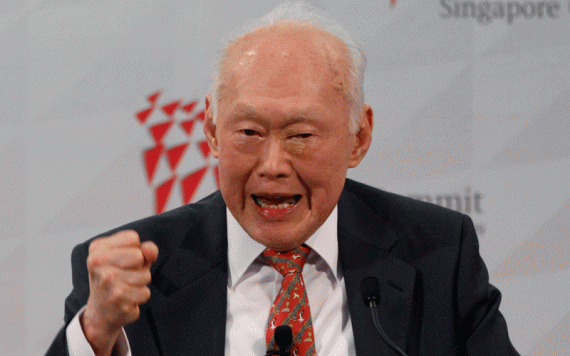

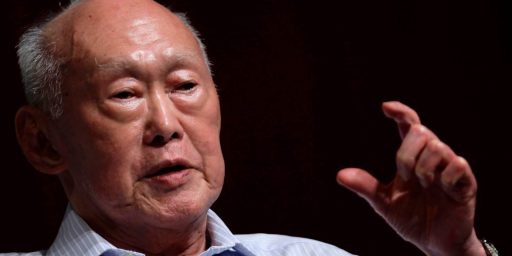
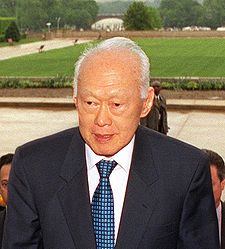
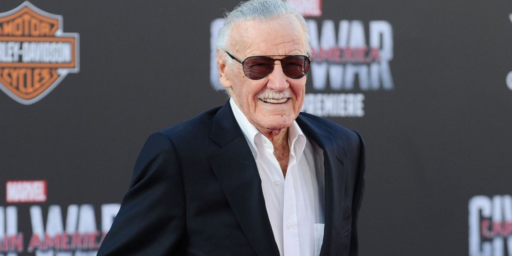

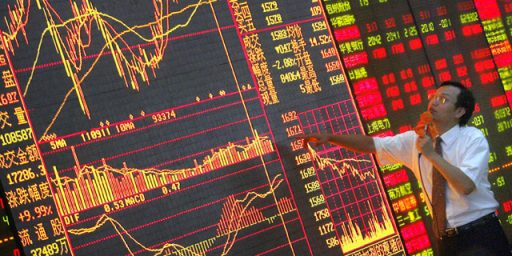
Truth be told, most people would be happy under a benevolent, authoritarian government. The problem is that history shows that the benevolency slowly disappears leaving just authoritarianism and corruption.
The proper mix of authority and liberty is hard to prescribe. Singapore is less than six million people which might allow for somethings that wouldn’t work in a larger state. I remember people praising old Mayor Daley’s Chicago as being run better than other larger cities. Harsh punishment for spitting out chewing gum and having the police adminster hair cuts to hippies are the kind of things that I don’t like, but the whole thing does seem to work for Singapore.
@Scott: As the Daily Show’s literature pointed out once, the future form of government yet-to-be-discovered is the constitutional robocracy. The problem with a benevolent dictatorship is the benevolent dictator always dies and is replaced by assholes and idiots. With a constitutional robocracy, any hint of tyranny could be cured by turning it off and on again.
@Tillman: I immediately thought of AUTO, the out of control robot running the spaceship Axiom in WALL-E. It had to be turned off to liberated the passengers. Of course, it took two rebellious robots to do it.
@Tillman:
Hopefully the off-buttons for our Robot Overloards will be accessible and functioning.
Otherwise Plan B is the Butlerian Jihad.
@Slugger: It went a long, long way past haircuts for hippies. I recently read Rick Pearlstein’s Nixonland. He goes into great detail about the Chicago ’68 riot, the ’68 Democratic convention, and police actions that fueled those situations. The Chicago police were a horror story. And with Homan Square, apparently still are.
I think its likely that LKY might have been the right man with the right model for his time. He may not be the right man or model for the current time.
In the mean time, a number of small countries have become independent and have had peaceful , successful democracies without Mr. Yew’s heavy handed controls. ( I offer up Barbados, in the eastern Caribbean, as an example).
@Tillman: @Scott: I like the robot thought. Let me flip it. So much of politics seems to revolve around an economic and psychological need for an underclass. And a lack of empathy with that underclass. Half the electorate will accept autocracy and cheerfully live in a packing crate, cooking pigeons over an open fire on a curtain rod spit, as long as they know the black guy down the road doesn’t even have a curtain rod. (I don’t recall who to credit for that line.) Maybe they’d be willing to accept the black guy if the robots don’t have curtain rods.
Until Skynet becomes self aware.
@Tillman: @Scott: Read a scifi story decades ago. Long story short: Two exploratory ships meet in deep space, translate languages, exchange technology, get along swimmingly. Realize they have planet killer weapons and they know we have planet killer weapons. They’ll have to destroy us, back plot our trajectory, and destroy Earth against the chance we might do the same thing. But we like them, and we don’t want to do genocide. What to do? OK guys, you know where Earth is. We’ll tell you how to bloodlessly conquer it. We know where your planet is, tell us how to conquer it. We’ll take real good care of your people. And we’ll come home and check occasionally how you’re treating humans. If we’re not pleased, we’ll blast your planet. The aliens said “We were about to make the same proposal.” And both planets lived very happily ever after.
@Scott:
That’s the age-old dilemma. A benevolent dictatorship is arguably more effective at “getting things done” than a democracy, but can trample over minority rights while doing so. Perhaps its biggest limitation throughout history is figuring out how to keep things benevolent. The Nerva–Antonine dynasty of Rome came close, but only lasted 5 “good” emperors.
@Slugger:
I think cultural differences account for some of that. Also, Singapore being a new state was a blank slate. The government at the time was keen to develop a new culture with higher levels of acceptance for repression in exchange for prosperity.
This is an interesting take on Lee.
But really, all that needs to be noted is that he was in charge for three decades & now his eldest son is prime minister. Is Singapore the chattel property of the Lee family, like Saudi Arabia?